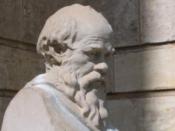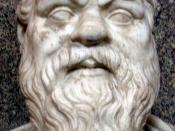Thinking for oneself leads to a richer, more genuine way of life. Socrates shows us this in his defense called Apology. After a life of service to Athens, Socrates is set before the court to be judged on charges of corrupting the youth and atheism. Although he may defend his charges arrogantly at times, he speaks the truth. His one desire is to instill virtue into the people of Athens. Now his selfless quest has led him to recon for his life. But in his time of need he refuses to pass away quietly by compromising his life long goals. He not only refutes his accusers with his speak, but does so convincingly. The way he defends his life and honor through adversity is what make Socrates a martyr for the cause.
Socrates suggests that there his accusers are both from the past and present. Those of the past have been the most harmful to him because they instilled a malice for him in the young in saying, "Far more dangerous are these, who began when you were children, and took possession of your minds with their falsehoods, telling of one Socrates, a wise man, who speculated about the heaven above, and searched into the earth beneath, and made the worse appear the better cause."
In hearing this in youth it is not hard to understand how simple things such as this could harbor lament for things unknown. Fallacies turn into things known as one comes of age. He reasons that they heard it,
"When you were impressible--in childhood, or perhaps in youth--and the cause when heard went by default, for there was none to answer." Socrates proclaims that ignorance manifests the hate which is cause for his trial.
Socrates argues that the reason he is brought...


